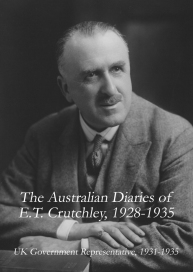Lieutenant Colonel Ernest Tristram Crutchley was sent to Australia by the UK Dominions Office from 1928 to 1935. Initially based in Melbourne and concerned with migration, in 1931 he became the forerunner to the UK’s first high commissioner to Canberra.
Crutchley’s private diaries are transcribed here for the first time. They reveal his candid views around the time of the Great Depression – of the country and its politics, of people ranging from struggling “Pommy” settlers to prime ministers and premiers. Widely known Australians such as Stanley Bruce, Dick Casey, Phil Collier, Ned Hogan, Billy Hughes, Isaac Isaacs, Jack Lang, John Latham, Joe Lyons, Bob Menzies, Jimmy Mitchell, Keith Murdoch, and James Scullin, feature often. Many take him into their confidence. A few are at the receiving end of either his wrath or wit or both. Among many interesting entries are those concerning anthropologist Daisy Bates, Captain John King Davis and RSS Discovery, the Duke of Gloucester, P.H.M. Goldfinch (associated with the right-wing Old Guard), George Julius (of the Australian National Research Council), John Latham on his 1934 visit to Japan, and UK visitors including Malcolm MacDonald (undersecretary of state for dominion affairs), economist Otto Niemeyer, and Plum Warner of the MCC. Crutchley also narrates the long struggle for justice for British settlers in Victoria as well as his intervention to save the 1932-3 test match series following the notorious “bodyline” scandal.
This transcription is accompanied by a brief biography, Crutchley’s beginnings of an autobiography, his equally fascinating description of 1931 Canberra, and his optimistic 1935 speech to the Royal Empire Society in London regarding the outlook for Australia. Included also are over 1400 biographical and explanatory notes, a list of almost 2000 names, a timeline, and the most frequently mentioned interlocutors.
This 723-page transcription can be viewed or downloaded free of charge from the National Library of Australia website. Click here.
The National Library of Australia also holds scanned copies of the original handwritten diaries.
